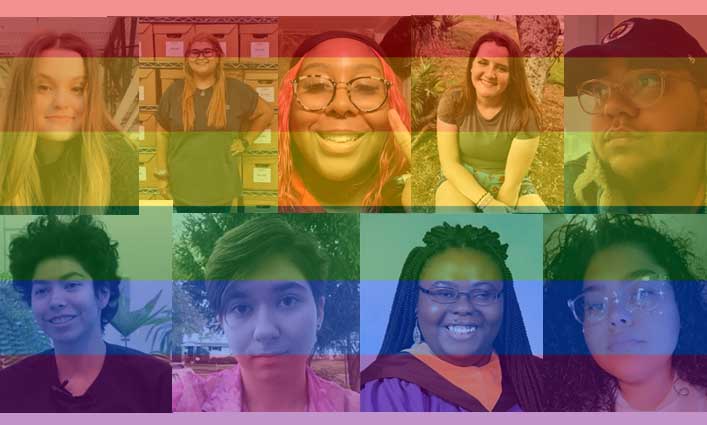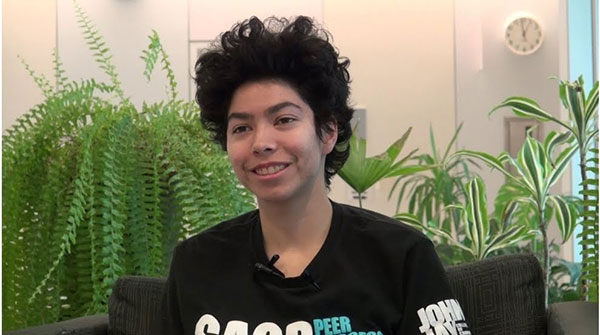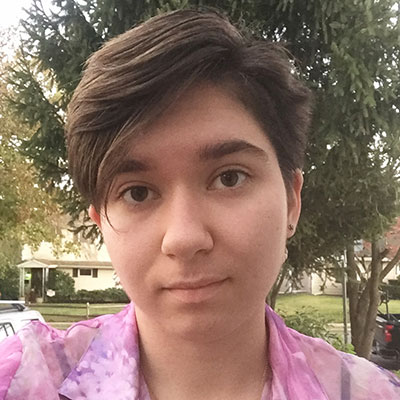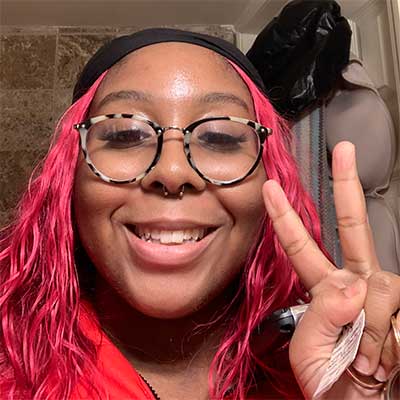
“As a mentee in the program, you’ll receive one-on-one support from a mentor who will provide you with resources, a listening ear, and a safe space to feel comfortable in defining who you are.” —Sam Ascencio
As a community committed to issues of justice, it's imperative that we continue to foster an inclusive and supportive environment for all of our students. That's why we're excited to announce the launch of Q’onnections, a new peer mentorship program created by the College’s LGBTQ+ Allies Club. The goal of Q’onnections is to connect LGBTQ+ students with their peers at John Jay and reassure them that they are seen, they are heard, they are supported, and that they matter. “Q’onnections is a mentoring program made for LGBTQ+ students and it’s built on years of research and development. Studies show that a sense of belonging in different subcultures on campus, may be more critical to a student’s experience than developing a sense of belonging at the institutional level,” says Sam Ascencio, Creator, Founder, and Director of Q’onnections and Vice President of the LGBTQ+ Allies Club. “As a mentee in the program, you’ll receive one-on-one support from a mentor who will provide you with resources, a listening ear, and a safe space to feel comfortable in defining who you are.”
“If you feel lost, if you want to be educated, and if you want to be an advocate for justice, consider booking a meeting with a Q’onnections mentor.” —Sam Ascencio
For Ascencio, Q’onnections is more than a mentoring program, it’s also a space where students can feel psychologically safe and grow as a person, community leader, and advocate; and where staff can provide support. “To train our mentors, we reached out to staff at the College including Jay Chopra, Coordinator of the SASP Peer Program, and Jon Salamak from the Center for Student Involvement and Leadership,” explains Ascencio, breaking down what was learned during the training. “We learned coaching methods, how to understand our role as mentors, how to use our identity coaching skills, and how to plan events and workshops for students,” he says. “My message to students at John Jay is this: If you feel lost, if you want to be educated, and if you want to be an advocate for justice, consider booking a meeting with a Q’onnections mentor. We are here for you.” We spoke with some of the mentors and mentees in Q’onnections to learn more about their journey to the program, what they want the John Jay community to know about the LGBTQ+ community, and their hopes for the future of the LGBTQ+ community at John Jay.

Sam Ascencio
Q’onnections Creator, Founder, and Director
Pronouns: he/him/his
What do you want the John Jay community to understand about the program and the queer community in general?
I want people to understand that allyship is a journey. You can’t claim to be an ally for a community that hasn’t given you that label. The title “ally” is given to you when you have honored the community to which you claim to be an ally for. This doesn’t invalidate your journey; it just means you have to walk further.
“You can’t claim to be an ally for a community that hasn’t given you that label.” —Sam Ascencio
What are your biggest hopes for John Jay’s LGBTQ+ students? How do you see yourself helping to make that goal a reality?
Our John Jay LGBTQ+ community needs so much support. Coming together to support community-building initiatives, like the creation of an LGBTQ+ Center and establishing LGBTQ+ Welcome Week, will show our LGBTQ+ students how much we care and value them. I’d love for us to get an LGBTQ+ Center on campus, where we can foster our Q’onnections mentorship program and help our LGBTQ+ students feel safe and supported. We want a safe space for our LGBTQ+ students. From one Bloodhound to another, please support us.

Adrianna Siwek
Q’onnections Coordinator and Mentor
Pronouns: she/her/hers
What was your training for this mentorship program like?
During training, we learned how to incorporate different pronouns into everyday language and techniques on how we could provide resources to help the LGBTQ+ community. One workshop focused on asserting identity and learning how to support someone who is coming out.
What are your biggest hopes for John Jay’s LGBTQ+ students?
I hope John Jay’s LGBTQ+ students feel seen, safe, and supported. My biggest hope for Q’onnections is that it will draw in people who aren’t in the LGBTQ+ community but want to support and learn how they can help. I feel like the LGBTQ+ community is forgotten in many ways. Hopefully, through Q’onnections we’re able to teach individuals how to handle situations and how to become better allies.

Gilianne “Gil” Oyola
Mentor
Pronouns: she/her/hers
How has your personal journey led to your role as a Q’onnections mentor?
It was a long journey of self-discovery and learning about myself and others. When I was in high school, I realized that I identified as asexual and I wanted to learn more about the different identities within the LGBTQ+ community. My research led me to learn about the injustices faced by the LGBTQ+ community and that made me become an advocate. Through Q’onnections, we’re advocating for other students and ensuring their voices are heard. We’re here to be a student’s shoulder to lean on and to amplify their voices so the entire John Jay community can hear what our LGBTQ+ students have to say.
What are your biggest hopes for John Jay’s LGBTQ+ students?
I hope they realize that there are a lot of allies out there advocating for them and working to make them feel more comfortable. I want John Jay to become a safe zone where students feel safe and welcomed on campus. As a mentor and peer, my goal is to help LGBTQ+ students learn to advocate for themselves.

Morgan DeGlopper
Mentee
Pronouns: she/her/hers
Why do you feel it’s essential that John Jay have a queer mentorship program like Q’onnections?
Going to college is hard. Queer individuals in general face additional difficulties that are hard to understand for those who haven’t experienced it. Q’onnections goes above and beyond your typical mentorship program. The program creates a space where mentees can receive guidance and learn more about their unique identities. It goes beyond academics and specifically addresses issues faced by LGBTQ+ individuals. In our current virtual world, and with the current political environment, queer students are feeling emotionally exhausted. Q’onnections offers students a safe space where they can be their authentic self, be supported and can learn and grow without any fear. Q’onnections is about love, support, and acceptance.
“Q’onnections is about love, support, and acceptance.” —Morgan DeGlopper
For students who are considering booking a meeting with a mentor, what do you want them to know?
It’s not as scary as you think it is. I know before joining Q’onnections, I was afraid I wasn’t knowledgeable enough about LGBTQ+ issues to relate. I was scared that the mentors would look down on me, but that wasn’t the case at all. The mentors are great at meeting you where you are and making you feel comfortable. They have a wealth of knowledge and have been training hard to make sure they can help. Don’t hesitate to reach out.

Koumamo Piebo
Mentee
Pronouns: she/her/hers
Why do you feel it was essential to create the Q’onnections program?
I believe it’s essential that students have a safe place to affirm, express, discover and celebrate their sexual, gender identity and gender expression. Our mentors are supportive, resourceful, experienced and they’re respectful of our privacy.
“My biggest hope for LGBTQ+ students is that they know that at John Jay, it’s safe to be exactly who you are.” —Koumamo Piebo
What are your biggest hopes for John Jay’s LGBTQ+ students?
My biggest hope for LGBTQ+ students is that they know that at John Jay, it’s safe to be exactly who you are. The creation of the Q’onnections mentorship program is just the first step. Hopefully in the future, we’ll see the launch of an LGBTQ+ Center, letting LGBTQ+ students know that their voices are heard, and that they have support. There are people at John Jay who are fighting and advocating for us.

Avi Severino
Mentor
Pronouns: he/him/his; they/them/their
How has your personal journey led to your role as a Q’onnections mentor?
I came out as a lesbian at 15 years old and then at the age of 28, I came out as a trans-male. What was really interesting to me was to see how open my friends and family were about my journey. They call me a trailblazer. I didn’t really have anyone to guide me or queer individuals I could look up to, but my family and friends were always supportive of me. So, I want to be able to be there for my peers who may need guidance or just someone to talk to.
What can a student expect if they have a meeting with a mentor in the Q’onnections program?
Students can expect for mentors to have resources ready for them whether it’s resources available at John Jay or at outside centers. At Q’onnections, students can expect for us to give them our full attention and empathy. We’re here to listen to the students. We want to make sure they feel comfortable talking to us. We’re here to show them the importance of their individuality and give them a sense of community.

Erica “Ricky” Klafehn
Mentor
Pronouns: she/her/hers
Why do you feel it’s essential that John Jay have a queer mentorship program like Q’onnections?
As of now, there’s no official LGBTQ+ Center on John Jay’s campus. Even though we’re working remotely this semester, Q’onnections provides guidance to students about the importance of representation, diversity, and inclusion in the John Jay community. Students who become mentees in Q’onnections will be met by a mentor that is open, honest, and willing to listen and help them with whatever they’re going through.
“Allies can use their voices to speak up and raise voices from the LGBTQ+ community that are often silenced or ignored.” —Erica “Ricky” Klafehn
How has your personal journey led to your role as a Q’onnections mentor?
I’ve identified as a cis straight woman of color for as long as I can remember. But I currently find myself questioning my identity and I haven’t solidified where I fall. Over the last four years, I’ve taught a Biology of Gender and Sexuality course, and the experience has allowed me to connect with students, learn more about the LGBTQ+ community, and has taught me how to become a better ally, supporter, and educator. Allies can use their voices to speak up and raise the voices from the LGBTQ+ community that are often silenced or ignored.

Alexia Wasniewski
Q’onnections Assistant Coordinator/Mentor
Pronouns: she/her/hers; they/them/their
How do you see yourself helping to make LGBTQ+ students at John Jay feel supported?
I see myself making that goal a reality by working as hard as I can to spread our message of inclusion and help create a space where LGBTQ+ students feel that they are part of a community that supports them in every way. We want to give them the resources they need to succeed, not only at John Jay, but in life after college.
Who do you admire the most and why?
I have great admiration for our Q’onnections Director Sam Ascencio. The amount of work and heart he has put in creating this program and advocating for the LGBTQ+ community here at John Jay is inspiring. He wants to make sure everyone feels like they belong and that there is a community here to support them.

Kiona Barnes
Mentor
Pronouns: she/her/hers
What was your training for this mentorship program like?
For me, the training was really invigorating and eye-opening. I went in with an open mind and was able to learn so much. The thing that struck me most is the use of different pronouns and the importance of using the correct language when speaking with or about someone in the LGBTQ+ community.
“Our struggles and experiences may be different, but our goal is the same, to create a safe space for all of our LGBTQ+ peers to feel seen, supported, and empowered.” —Kiona Barnes
What can a student expect if they have a meeting with a mentor in the Q’onnections program?
I want students to know that mentors are just like them. I’m a mentor, but I’m also a student who is still trying to find my place and I’m still learning. Our struggles and experiences may be different, but our goal is the same, to create a safe space for all of our LGBTQ+ peers to feel seen, supported, and empowered.



